At Angling Heritage (UK) we have established a charity to preserve angling audio visual, photographic and written material the aim of which is to record social history. In trying to find this sort of information one realises how important it is; so much has been lost.
There was one angler whose exploits were so famous that he became the face of angling in the media; that man was Richard Walker, but even his footage has suffered from such problems.
These TV, radio and vinyl productions give an account of his work together with an outline of the content source. I am sure some readers will be able to add to this, or even supply material where none has been found to date. If so we would be very pleased to hear from you.
TV appearances
Walker first appeared on television in the “Tonight” programme broadcast on ‘Coarse Fishing’ on the 7th November 1957, but other than this record, nothing has been archived.
Similarly, he made another appearance on the same programme entitled ‘Fishthink’ on the 2nd November 1962, but alas no record was kept.
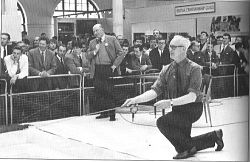 However, a picture does exist on his next appearance in a news piece at a National Angling Show held at Beachampton. Walker gave a demonstration of fly casting with Terry Thomas explaining the intricacies to his audience. In a brief interview, Walker was asked if he felt his approach had spoilt fishing for many by making it easier to catch specimen fish. A somewhat irked Walker replied he had never had a complaint about people catching better fish. (A picture of the event can be seen in ‘Richard Walker biography of an angling legend’ by Barrie Rickards [Medlar Press, 2007]).
However, a picture does exist on his next appearance in a news piece at a National Angling Show held at Beachampton. Walker gave a demonstration of fly casting with Terry Thomas explaining the intricacies to his audience. In a brief interview, Walker was asked if he felt his approach had spoilt fishing for many by making it easier to catch specimen fish. A somewhat irked Walker replied he had never had a complaint about people catching better fish. (A picture of the event can be seen in ‘Richard Walker biography of an angling legend’ by Barrie Rickards [Medlar Press, 2007]).
 His next appearance was in ‘Learning to Fish’ – This programme was made by Southern Independent Television in October 1965. It was presented by Jack Hargreaves and featured Richard Walker along with Fred J Taylor, John Burrett, Dave Steuart, Peter Stone, Peter Ward, Owen Wentworth, Peter Wheat and Colin Willock. It took the form of a match between young pupils supported by a celebrity angler. Only the pupils’ weight counted although they took it in turns with the celebrities who had to catch a fish before they could return the rod to the pupil. The instructor couldn’t touch the rod whilst the pupil fished, merely give tuition and encouragement. The winner was Denise Brehaut who managed over 7lb of fish (mainly consisting of a pike). Richard Walker’s protégé was second with 4lb 6oz with Peter Wheat’s pupil was third with a few nice roach for just over 2lb. The film was shown on Boxing Day to just over 13 million viewers. The film was also selected to represent Britain at the International Festival of Documentary Films in Venice on 21-30th July 1966. This was rereleased on DVD in July 2017 on Jack Hargreaves' "Out of Town" boxed set.
His next appearance was in ‘Learning to Fish’ – This programme was made by Southern Independent Television in October 1965. It was presented by Jack Hargreaves and featured Richard Walker along with Fred J Taylor, John Burrett, Dave Steuart, Peter Stone, Peter Ward, Owen Wentworth, Peter Wheat and Colin Willock. It took the form of a match between young pupils supported by a celebrity angler. Only the pupils’ weight counted although they took it in turns with the celebrities who had to catch a fish before they could return the rod to the pupil. The instructor couldn’t touch the rod whilst the pupil fished, merely give tuition and encouragement. The winner was Denise Brehaut who managed over 7lb of fish (mainly consisting of a pike). Richard Walker’s protégé was second with 4lb 6oz with Peter Wheat’s pupil was third with a few nice roach for just over 2lb. The film was shown on Boxing Day to just over 13 million viewers. The film was also selected to represent Britain at the International Festival of Documentary Films in Venice on 21-30th July 1966. This was rereleased on DVD in July 2017 on Jack Hargreaves' "Out of Town" boxed set.
In the 1970’s, Walker appeared on the Philpot File. Two editions were filmed, the first featuring Barrie Rickards which was edited to portray the angler as a boring person. The second featured Walker who put his point over with the use of his arms making the film difficult to edit. This resulted in a much more representative account being broadcast. (Richard Walker biography by Barrie Rickards, Medlar Press 2007). We have been unable to find any film footage.
Walker also made two appearances on the long running television series ‘Out of Town’ presented by Jack Hargreaves.
The first was a programme on carp fishing. Prior to the broadcast Dick picked Jack Hargreaves up in the middle of the night in an old van which duly broke down. They had to wake a garage owner to come to their aid. Then when they had set up with the alarms, Dick went to sleep and had to be woken by Jack when he had a run,and he then caught carp to order.
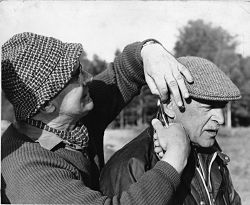
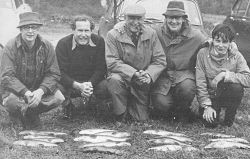
In Barrie Rickard’s biography, Tim Walker also mentions a programme about trout fishing filmed circa1965 which he says was filmed in Hampshire on “Two Lakes” Alex Behrendt’s water with Colonel Crow, Oliver Kite and Jack Hargreaves, in which Walker hooked crow in the ear for standing behind him when casting.
As with the earlier Hargreaves’ work, it isn’t known whether any of the film footage still survives, and these notes are taken from people’s recollections.
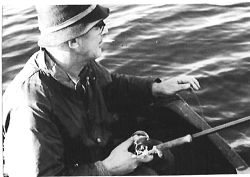 Summer Search; Lomondside – broadcast on 12th May 1970, told the story of three boys from Glasgow who decide to go fishing to Loch Lomond. They stop at a tackle shop to buy two spoons, a landing net (folding trout style) and a Fishing Gazette bung for their pike fishing (cost 34/8d). Upon arrival they want to hire a boat, but there aren’t any so some ‘nice men’ sharing three boats take them out, one in each. They just happen to be Dick Walker, Fred Buller, Pete Thomas and Bill Giles. They are shown the basics of pike fishing with deadbait and each catches a pike. (Why doesn’t this ever happen to me!!!)
Summer Search; Lomondside – broadcast on 12th May 1970, told the story of three boys from Glasgow who decide to go fishing to Loch Lomond. They stop at a tackle shop to buy two spoons, a landing net (folding trout style) and a Fishing Gazette bung for their pike fishing (cost 34/8d). Upon arrival they want to hire a boat, but there aren’t any so some ‘nice men’ sharing three boats take them out, one in each. They just happen to be Dick Walker, Fred Buller, Pete Thomas and Bill Giles. They are shown the basics of pike fishing with deadbait and each catches a pike. (Why doesn’t this ever happen to me!!!)
Included for completeness, although not of Walker was ‘Late Night Line Up’. This featured an article on carp fishing including film footage of Clarissa, Walker’s 44lb carp which was kept at London Zoo. Broadcast on 16th June 1970. The off-cuts of this film were sold to River Reads recently and have now been preserved onto DVD including restoration of the film colour which had deteriorated with the passing of time.
Also broadcast in 1970, on the 18th November was a piece on grayling fishing featured in ‘Nationwide’. Part one showed Walker catching a bagful of grayling of a particularly bleak day on the River Test. Michael Barrett, the presenter was then seen eating the fish on the river bank after they had been prepared by a chef discussing different recipes.
His next appearance was in 1972 in Essex demonstrating fly casting. This is the only information kindly supplied by Mrs. Pat Marston-Walker who found a reference to it in her files. Nothing else is known.
He was then broadcast on BBC TV in 1974 in Animal Magic, the long running television series presented by Johnny Morris in his inimitable manner. Walker was filmed extolling the Trout and Salmon Association scheme to teach youngsters to fly fish. One memorable line that he taught the children about the necessity for stealth when fishing was “Imagine both you and the fish have a gun and the first one to see the other shoots,” which would be good advice for many anglers today!
The last programme to which we can find reference (but again, not the film footage) was the ‘Frost Programme’ in the 1970’s (Rediffusion TV). This discussion is featured in ‘Dick Walker’s Angling’. The programme was about whether fishing is cruel and can fish feel pain? It featured Walker and Brigid Brophy from the RSPCA. Walker’s argument focussed on the fact that fish such as trout eat sticklebacks and caddis with sharp prongs out of choice, so they don’t feel sharp points. Brophy said that commercial fishing was OK, but fishing for pleasure was cruel. Walker comments in the book that it seems strange to be acceptable practice to inflict damage to fish by ripping out hooks as long-liners do, provided it is for commercial gain which people are happy to eat. Whereas the more humane angler who despatches his fish immediately is cruel. No film footage of this has been found.
Walker wasn’t just a recognised television personality, he also made several appearances on radio which are detailed below.
‘In Town Tonight’ appears to be his first broadcast on 17th May 1952 and included an interview about the Daily Mail Angling Contest. No recording or transcript exists for this programme.
‘Some Country Books’ was broadcast on 29th June 1953. This programme contained an item about Walker’s new book Still Water Angling [Macgibbon & Kee, 1953]. However, as with several of these older news-style items, no recording or transcript exists.
‘The Countryside’ was a Midland Home Service Broadcast on 14th July 1953. The speakers in the programme were BB (Denys Watkins-Pitchford), Jack Ivester Lloyd, Richard Walker, Elizabeth George and John Bird. Walker’s contribution was a piece of 5-6 minutes’ duration, on the effects of summer on the fish. Fortunately although the original recording is no longer in existence, a transcript of the programme was made and is held in the BBC’s archive.
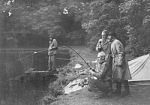
 Similarly ‘Night Fishing’ another Midlands Home Service broadcast on Monday 20th July 1953 was an interesting exercise with Walker fishing for carp. Presented at the bankside by Bill Lotto and with Bernard Venables as the “on bank” expert to explain the technicalities, Walker fished (supported by Maurice Ingham).
Similarly ‘Night Fishing’ another Midlands Home Service broadcast on Monday 20th July 1953 was an interesting exercise with Walker fishing for carp. Presented at the bankside by Bill Lotto and with Bernard Venables as the “on bank” expert to explain the technicalities, Walker fished (supported by Maurice Ingham).
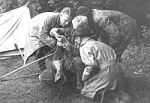

The first fish got away, but Walker still managed to catch a 16lb’er for the gathered ensemble. Whilst no recording exists, only the transcript of the programme remains. A picture of this can be seen in the Richard Walker biography mentioned earlier.
‘World of Sound’ was broadcast on 21st May 1964. The interviewer (Denys Gueroult) plays devil’s advocate about the sport of fishing with Walker countering, and also getting very annoyed about the raw deal anglers get being the ‘Cinderella’ sport, even though they pay for it!! Walker suggests a day’s strike by all anglers would bring the nation to a standstill and focus the minds of government and water authorities to do something about sewage treatment and industrial pollution that fisherman have to suffer which contaminates the watercourses.
Sadly, nothing exists of the next item which was part of a news broadcast. The policy being news items shouldn’t be transcribed or kept. It was an element of ‘Today’ entitled ‘Anglers Units’ and was broadcast on 2nd June 1966 on the Home Service featuring an interview with Walker.
The next radio broadcast was a true piece of angling history. ‘Good Fishing’ was Gerry Savage’s programme on Radio Medway. The programme started with a round up of local items of interest but went on to feature Walker recounting his capture of Clarissa, his record carp. The broadcast was made in 9th June 1972 (The tape is now in the possession of River Reads)
To date, Walker is the only personality known primarily for his angling to feature on the Radio 4 programme ‘Desert Island Discs’ which was broadcast on 6th July 1974. This highlighted Walker’s love of opera, but included music by Joan Baez and Marlene Dietrich. Walker talked about being encouraged to fish by his paternal grandfather, and his maternal grandfather being a farmer and teaching him all about natural history. He also talks about water authorities and the poor pay of lady fly tyers. Asked what book he would like to take with him, he asks for “Puck of Pook’s Hill” by Kipling as it reminds him of all the things he knew and loved about England, and finished “Never mind your desert island, I’d get off it!” You can now listen to the recording on the BBC archives (www.bbc.co.uk/radio4/features/desert-island-discs)
Hook Line & Sinker (also sold on cassette) was Martin James’ tribute on his Radio Lancashire programme broadcast in 1988. It includes Fred J Taylor’s interview at Walker’s funeral together with a different recording of Walker relating his catch of Clarissa. The discussion was free ranging and also covered his writing career, his trilby hat and its demise, baits and water authorities (and how they were improving). Perhaps this remains the best broadcast, as it allows the listener to have a better understanding of the man through the inflections and tone of his voice, which is lost in just reading the written word.
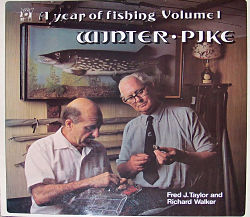 The final item is a vinyl long playing record (LP) A World of Fishing: Vol.1 Winter Pike. This charming work took the form of Walker and Fred J Taylor fishing on the Thames, and at Tring Reservoir, talking about their piking methods, the effect of weather, and gives a chance to hear some of Walker’s range of dialects which are excellent. Walker also managed to catch a decent pike for good measure too. The LP was produced by Fauna Records (Guy & Ted Fletcher). Two other recordings were made; Carp, again recorded with Fred J Taylor on Kevin Clifford’s lake, and Trout. Regrettably, there is no record of these ever seeing the light of day. Fred J joked that this was at the time of the oil shortage in the 1970’s and there wasn’t enough plastic for this production and that of the Rolling Stones.
The final item is a vinyl long playing record (LP) A World of Fishing: Vol.1 Winter Pike. This charming work took the form of Walker and Fred J Taylor fishing on the Thames, and at Tring Reservoir, talking about their piking methods, the effect of weather, and gives a chance to hear some of Walker’s range of dialects which are excellent. Walker also managed to catch a decent pike for good measure too. The LP was produced by Fauna Records (Guy & Ted Fletcher). Two other recordings were made; Carp, again recorded with Fred J Taylor on Kevin Clifford’s lake, and Trout. Regrettably, there is no record of these ever seeing the light of day. Fred J joked that this was at the time of the oil shortage in the 1970’s and there wasn’t enough plastic for this production and that of the Rolling Stones.
All these recordings show the effect the Walker had, not only within the angling circles with his clinical thinking and innovation, but also portraying the thoughtful face of angling to the general public through the media. His effect was profound and we may never see his like again.
This article was written for and appeared in Classic Angling in 2009